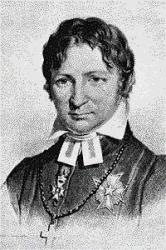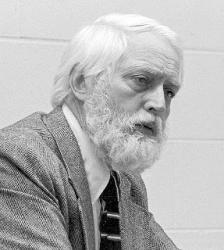Planning worship?
Check out our sister site, ZeteoSearch.org,
for 20+ additional resources related to your search.
- |
User Links
Person Results
Christopher Edwin Willing
1830 - 1904 Composer of "ALSTONE" in The Cyber Hymnal Christopher Edwin Willing; Devon, England, 1830
Evangelical Lutheran Hymnal, 1908
Christopher Edwin Willing
Timothy E. Kimbrough
Arranger of "[Whose child is this? I ask]" in Global Praise 2
Timothy E. Kimbrough
Frans Michael Franzén

1772 - 1847 Person Name: Frans Mikael Franzén Author of "Look to Jesus Christ Thy Saviour" in The Hymnal and Order of Service Franzén, Franz Michael, was born at Uleabôrg, Finland, in 1772, and educated at the University of Abo, where he became Librarian and Professor of Literary History. He was subsequently Minister at Kumla, Orebro, Sweden, and then of Santa Clara, in Stockholm. He was consecrated Bishop of Hernosand, in 1841, and died there in 1847. (See Supplement to Longfellow's Poets and Poetry of Europe.) Of his pieces one is in English common use. It begins "Jesum haf i ständigt minne," translated by Mrs. Charles in her Christian Life in Song, 1858, p. 250, as "Jesus in Thy memory keep" (Looking unto Jesus). Usually it begins with stanza ii., "Look to Jesus, till, reviving."
--John Julian, Dictionary of Hymnology, Appendix, Part II (1907)
Frans Michael Franzén
Thomas Haweis

1734 - 1820 Author of ""Come and welcome"" in Laudes Domini Thomas Haweis (b. Redruth, Cornwall, England, 1734; d. Bath, England, 1820) Initially apprenticed to a surgeon and pharmacist, Haweis decided to study for the ministry at Oxford and was ordained in the Church of England in 1757. He served as curate of St. Mary Magdalen Church, Oxford, but was removed by the bishop from that position because of his Methodist leanings. He also was an assistant to Martin Madan at Locke Hospital, London. In 1764 he became rector of All Saints Church in Aldwinkle, Northamptonshire, and later served as administrator at Trevecca College, Wales, a school founded by the Countess of Huntingdon, whom Haweis served as chaplain. After completing advanced studies at Cambridge, he published a Bible commentary and a volume on church history. Haweis was strongly interested in missions and helped to found the London Mission Society. His hymn texts and tunes were published in Carmino Christo, or Hymns to the Savior (1792, expanded 1808).
Bert Polman
============================
Haweis, Thomas, LL.B., M.D., born at Truro, Cornwall, 1732. After practising for a time as a Physician, he entered Christ's College, Cambridge, where he graduated. Taking Holy Orders, he became Assistant Preacher to M. Madan at the Lock Hospital, London, and subsequently Rector of All Saints, Aldwincle, Northamptonshire. He was also Chaplain to Lady Huntingdon, and for several years officiated at her Chapel in Bath. He died at Bath, Feb. 11, 1820. He published several prose works, including A History of the Church, A Translation of the New Testament, and A Commentary on the Holy Bible. His hymns, a few of which are of more than ordinary merit, were published in his
Carmina Christo; or, Hymns to the Saviour. Designed for the Use and Comfort of Those who worship the Lamb that was slain. Bath, S. Hayward, 1792 (139 hymns), enlarged. London, 1808 (256 hymns). In 1794, or sometime after, but before the enlarged edition was published, two hymns "For the Fast-day, Feb. 28, 1794," were added to the first edition. These were, "Big with events, another year," and "Still o'er the deep the cannon's roar."
The most popular and widely used of his hymns are, "Behold the Lamb of God, Who bore," &c.; "Enthroned on high, Almighty Lord"; and “O Thou from Whom all goodness flows." The rest, all being from Carmina Christo, first edition 1792, are:—
1. Dark was the night and cold the ground. Gethsemane.
2. From the cross uplifted high. Christ in Glory.
3. Great Spirit, by Whose mighty power. Whitsuntide.
4. Submissive to Thy will, my God. Resignation.
5. The happy morn is come. Easter.
6. Thou Lamb of God, that on the tree. Good Friday. The hymn, "Thy Head, the crown of thorns that wears," in Stryker & Main's Church Praise Book, N. Y., 1882, begins with st. ii. of this hymn.
7. To Thee, my God and Saviour, My heart, &c. Praise for Redemption.
--John Julian, Dictionary of Hymnology (1907)
Thomas Haweis
Justus Gesenius

1601 - 1673 Person Name: J. Gesenius, 1601-73 Author of "Before Thy Throne I Now Appear" in Evangelical Lutheran Hymnary Gesenius, Justus, D.D., son of Joachim Gesenius, pastor at Esbeck, near Lauenstein, Hannover; was born at Esbeck, July 6, 1601. He studied at the Universities of Helmstedt and Jena, graduating M.A at Jena in 1628. In 1629 he became pastor of St. Magnus's Church, Brunswick; in 1636 court chaplain and preacher at the Cathedral in Hildesheim; and in 1642 chief court preacher, consistorialrath, and general superintendent at Hannover. He died at Hannover, Sept. 18, 1673 (Koch, iii 230-237; Allgemeine Deutsche Biographie, ix. 87-88; Bode, p. 76, &c).
Gesenius was an accomplished and influential theologian, a famous preacher, and distinguished himself by his efforts to further the catechetical instruction of the children of his district. Along with D. Denicke (q.v.) he edited the Hannoverian hymnbooks of 1646-1660. Both he and Denicke aimed at reducing the older German hymns to correctness of style according to the poetical canons of Martin Opitz; not so much interfering with the theology or making the authors speak a terminology foreign to them. Consequently their recasts, while setting a bad example, and while often destroying much of the force and freshness of the originals, were not by any means so objectionable as the recasts of the Rationalistic period, and moreover were soon widely accepted.
As no authors' names are given in the Hannoverian hymnbooks, it is difficult to assign the authorship of the new hymns and recasts therein contained. The following is generally, and apparently with reason, ascribed to Gesenius:
Wenn meine Sünd' mich kränken. Passiontide. His finest hymn as regards depth, warmth, and finish. First published in the Hannover Gesang-Buch 1646, No. 49, in 8 stanzas of 7 lines. It has been called a recast of the hymn "Hilf Gott, dass mir gelinge," but bears not the slightest resemblance to it. Included in Crüger's Praxis, 1656, and many later collections, as the Berlin Geistliche Lieder S., ed. 1863, No. 277. By a not unjust retribution it was soon recast, and appeared in the Lüneburg Gesang-Buch, 1661, as "Wenn mich die Sunden kränken." Translated as:—
1. When guilt and shame are raising. In full, by J. C. Jacobi, in pt. ii., 1725, of his Psalter Germanica, p. 4 (1732, p. 34). In the Moravian HymnBook of 1789, No. 106, it is altered to “O Lord, when condemnation"; and in the edition 1886, it begins with st. v., "Lord, let Thy bitter passion." A cento of stanzas ii., iii., v., from the Moravian Hymn Book, 1801, was adopted by Montgomery in his Christian Psalmist, 1825, beginning, "O wonder far exceeding," and this is in the New Zealand Hymnal. 1872.
2. 0 Lord, when my sins grieve me. A good translation of stanzas i., ii., iv., v., by A. T. Russell, as No. 81 in his Psalms & Hymns, 1851.
3. When sorrow and remorse. In full, by Miss Winkworth in her Lyra Germanica, 1st Ser., 1855, p. 74. A cento consisting of lines 1-4 of stanzas i., iv.—vi., and of stanza vii., rewritten to S.M., is in the Pennsylvanian Lutheran Church Book, 1868.
4. 0 Lord, when condemnation. A full and good translation, included as No. 84 in the 1857 ed. of Mercer's The Church Psalter and Hymnbook. Probably by Mr. Mercer, but mainly taken from the Moravian Hymnbook, 1789, and from Miss Winkworth. Repeated, abridged, in his Oxford ed., 1864, No. 149, and in the Toronto HymnBook, 1862.
5. When o'er my sins I sorrow. A good translation, based on her 1855 version, and omitting stanzas ii.—iv., by Miss Winkworth, as No. 48 in her Chorale Book for England, 1863. [Rev. James Mearns, M.A.]
-- John Julian, Dictionary of Hymnology (1907)
Justus Gesenius
James Nevett Steele
1850 - 1916 Person Name: J. N. S. Composer of "[What child is this, who, laid to rest]" in Hymns and Carols Set to Music
James Nevett Steele
Ron Harris
b. 1941 Person Name: R. H. Author of "My Master’s House" in Favorites Number 9 Harris, Ronald S.; composer, author, arranger; b. 12-16-41, Los Angeles, Calif.
Ron Harris
Stanley M. Wiersma

1930 - 1986 Person Name: Stanley M. Wiersma, 1930- Author of "O Lord, Our Lord" in Hymns for Youth Pseudonym: Sietze Buning
**********
Stanley Marvin Wiersma (b. Orange City, IA, 1930; d. Amsterdam, the Netherlands, 1986) was a poet and professor of English at Calvin College, Grand Rapids, Michigan, from 1959 until his sudden death in 1986. He attended Calvin as an undergraduate and received a Ph.D. from the University of Wisconsin in 1959. His love for the Genevan psalms is reflected in the two books of poetry for which he is most widely known: Purpaleanie and Other Permutations (1978) and Style and Class (1982), both written under the pseudonym Sietze Buning. He also wrote More Than the Ear Discovers: God in the Plays of Christopher Fry and translated many Dutch poems and hymn texts into English, including the children's hymns published in All Will Be New (1982).
Bert Polman
Stanley M. Wiersma
Charlotte G. Homer
1856 - 1932 Author of "Thy Will in Me" in Alexander's Gospel Songs No. 2 Pseudonym. See also Gabriel, Chas. Hutchinson, 1856-1932
Charlotte G. Homer
Johann Rudolf Ahle
1625 - 1673 Person Name: J. R. Ahle Composer of "BLESSED JESUS, AT THY WORD" in Christian Hymns Johann Rudolph Ahle, b. Mühlhausen, 1625; Ahle studied theology at Erfurt University. Little is known about his musical education, but be became well known as an organist while he was in Erfurt. He returned to Mühlhausen and became an organist at St. Blasius Church, he composed organ music but is know for his sacred choral music. He was the father of Johann Georg, who was also a composer and succeeded his father as organist at St. Blasius Church. Johann Rudolf became mayor of Mühlhausen late in his life and died there in 1673.
Dianne Shapiro (from Bach Cantatas Website www.bach-cantatas.com/Lib/Ahle-Johann-Rudolf.htm)
Johann Rudolf Ahle


 My Starred Hymns
My Starred Hymns


